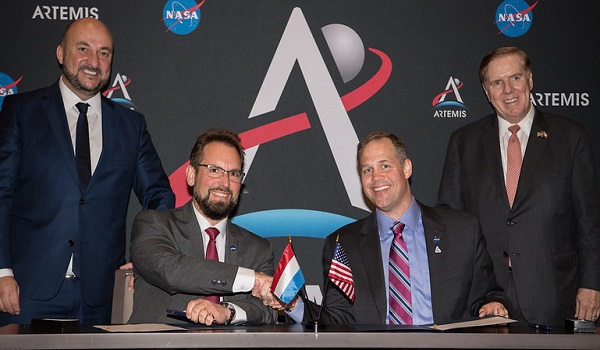 L-R: Deputy Prime Minister, Minister of the Economy, Étienne Schneider; LSA Chief Executive Officer, Dr. Marc Serres; NASA Administrator, James. F. Bridenstine; US Ambassador to Luxembourg, Randy Evans;
Credit: NASA / Aubrey Gemignani
L-R: Deputy Prime Minister, Minister of the Economy, Étienne Schneider; LSA Chief Executive Officer, Dr. Marc Serres; NASA Administrator, James. F. Bridenstine; US Ambassador to Luxembourg, Randy Evans;
Credit: NASA / Aubrey Gemignani
The Luxembourg Space Agency (LSA) yesterday signed agreements with both the National Aeronautics and Space Administration (NASA) and the German Aerospace Center (Deutsches Zentrum für Luft- und Raumfahrt; DLR), aimed at deepening space co-operation, at the 70th International Aeronautical Congress held on Tuesday in Washington DC.
LSA-NASA Agreement
Following the Luxembourg and US governments' signature of a Memorandum of Understanding (MoU) on space in May 2019, NASA Administrator James F. Bridenstine and LSA Chief Executive Officer (CEO) Dr. Marc Serres signed a joint statement of intent to further deepen US-Luxembourg co-operation in space. The signing ceremony took place in the presence of Luxembourg's Deputy Prime Minister and Minister of the Economy, Étienne Schneider, and the US Ambassador to Luxembourg, Randy Evans.
James F. Bridenstine and Marc Serres acknowledged the steps taken in the US and in Luxembourg to advance opportunities for the commercial use of space. They noted that these developments have set the stage for fruitful collaboration in areas of mutual interest, particularly in the context of NASA's priority on returning humans to the surface of the Moon by 2024 through the Artemis programme, and its plans to establish the basis for a long-term human presence there by 2028, with a view towards human exploration of Mars.
They also underlined the potential these initiatives have for space resources exploration and utilisation as well as for private sector entities and public private partnerships to contribute to the exploration and utilisation of the Moon, Mars and other celestial bodies. For his part, Marc Serres emphasised that the LSA places great importance on its aim to contribute to the peaceful exploration and sustainable utilisation of space resources for the benefit of humankind.
The joint statement signed on 22 October 2019 between NASA and LSA thus details a number of potential areas for future collaboration such as space applications, space exploration and utilisation. The agencies will continue to explore these areas through technical and programmatic discussions with the objective of identifying potential collaboration. In parallel, NASA and LSA intend to pursue a Framework Agreement as a means of facilitating future collaboration between the two agencies.
Ambassador Randy Evans, who was present at the signing ceremony, later issued a statement announcing the news. The ambassador said: "This is another step forward in the cooperation we envisioned as part of the Space Memorandum of Understanding signed on 10 May 2019, which established a more formal exchange of information between our two countries to facilitate research, exploration, development, and use of space, as well as the continued growth of our respective space industries through new commercial and investment opportunities".
LSA-DLR Agreement
In addition, Tuesday saw representatives of the DLR and LSA sign a letter of intent at the International Aeronautical Congress to co-operate on space research activities, with a particular focus on areas such as navigation, satellite communications, space exploration and space resources, including robotics and in-orbit services. Indeed, the LSA expressed interest in co-operating with the DLR to establish an interdisciplinary research center in Luxembourg within the SpaceResources.lu initiative. The aim would be to develop a sustainable commercial space resources utilisation industry.
Prof. Dr. Pascale Ehrenfreund, Chair of the Executive Board, and Prof. Dr. Hansjörg Dittus, Member of the Executive Board for Space Research and Technology, signed the letter of intent on behalf of the DLR, whilst Marc Serres signed for the LSA.
LSA CEO Marc Serres commented: "I am very pleased that with the letter of intent we further formalise and enhance the cooperation on space activities between the DLR and the LSA. The German Aerospace Center has already been a long-standing partner. Together with the DLR and other partners, we want to further develop research activities in areas such as the utilisation of space resources for the benefit of humankind".








